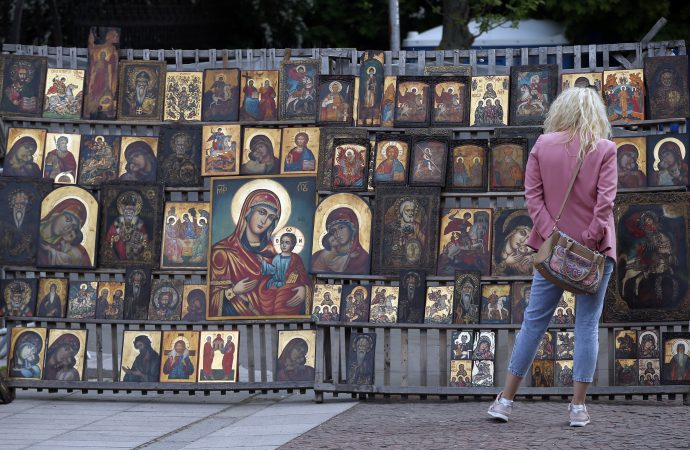Speaking to leaders of the Bulgarian Orthodox church on his first day in the country, Pope Francis channeled his namesake Saint Francis of Assisi, urging Catholic and Orthodox leaders to pursue unity through commitment to mission and an “ecumenism of the poor.”
He spoke to members of the Bulgarian Orthodox Patriarch Neophyte and members of the church’s Holy Synod, pointing to ties established between the Catholic and Bulgarian Orthodox churches from the time of then-Archbishop Angelo Giuseppe Roncalli, the future Saint Pope John XXIII, who served as apostolic delegate in Bulgaria from 1925-1934.
When John XXIII called the Second Vatican Council in 1962, the Bulgarian Orthodox Church sent observers. For the past 50 years, Bulgarian delegations have visited Rome to honor the feast of Saints Cyril and Methodius, celebrated by Catholics Feb. 14 and by Orthodox on May 11.
“I am confident that, with the help of God, and in his good time, these contacts will have a positive effect on many other dimensions of our dialogue,” the pope said.
Francis said that in the meantime, the churches don’t just share what he refers to as an “ecumenism of blood” in martyrdom, but “we are called to journey and act together in order to bear witness to the Lord, particularly by serving the poorest and most neglected of our brothers and sisters,” calling the act an “ecumenism of the poor.”
Francis is currently on a 3-day visit to Bulgaria and Macedonia, two of the poorest nations in Europe. Northern Bulgaria is the poorest area in Europe, with many villages that popped up during a 1950s farming boom dying out due to emigration.
In Bulgaria, Catholics are a small minority, making up just 0.5 percent of the population of 7.1 million, most of whom are Bulgarian Orthodox.
Traditionally aligned with Russia, the Bulgarian Orthodox Church does not engage in formal Catholic-Orthodox dialogue. In 2016, they boycotted a pan-Orthodox council held in Crete, and regarding the pope’s visit, the Holy Synod has insisted they will not participate in any joint prayer services.
In his speech, Neophyte said the Bulgarian Orthodox Church has “a truly special attitude” toward the pope’s visit. “Your desire to visit the Holy Synod we see as an expression of respect toward the Orthodox church in Bulgaria. We assure you of our reciprocal respect,” he said.
However, pointing to various points of calm and tension between the Catholic and Orthodox worlds, he said that in his view, while well documented, “this part of the history of the church has not been analyzed in a very impartial way and the necessary conclusions have not been reached.”
“The life of the church is guided by Our Lord Jesus Christ. If God has allowed that something happens, he knows why he has allowed it and we expect that we will also know why,” he said, adding that Bulgarian Orthodox “are firmly convinced that for what regards the faith, there cannot and should not be compromises.” He also thanked the pope for the welcome of their delegation’s visit to Rome, which will happen May 24.
Speaking of unity, Francis pointed to examples of brother saints Cyril and Methodius, who despite resistance spread Christianity throughout the Slavic world and who are highly revered by both Catholic and Orthodox communities.
“Despite adversities they made their highest priority the proclamation of the Lord, the call to mission,” he said. “Despite premonitions of the painful divisions which would take place in centuries to come, they chose the prospect of communion.”
“Mission and communion: two words that distinguished the life of these two saints and that can illumine our own journey towards growth in fraternity,” he said, and urged leaders to also pursue an “ecumenism of mission.”
Francis said Cyril and Methodius don’t just set an example for the churches, but they also “have much to say to us about the future of European society.”
Quoting St. John Paul II, who visited Bulgaria in 2002, he said the brothers were “the promoters of a united Europe and of a profound peace among all the continent’s inhabitants, showing the basis for a new art of living together, with respect for differences, which in no way are an obstacle to unity.”
“We too, as heirs of the faith of the saints, are called to be builders of communion and peacemakers in the name of Jesus,” he said, calling Bulgaria a “spiritual crossroads, a land of contacts and mutual understanding.”
Francis noted how he would visit the Patriarchal Cathedral of Saint Aleksander Nevskij, where he will pray there in front of an image of Saints Cyril and Methodius.
Both Aleksander Nevskij, who hails from the Russian tradition, and the Holy Brothers, who came from the Greek tradition and evangelized the Slavic peoples, “show us the extent to which Bulgaria is a bridge-country,” the pope said.
He assured all of his prayers for the patriarch and all Orthodox faithful, “and for our journey in an ecumenism of blood, of the poor and of mission,” asking in turn for prayers with confidence that prayer “is the door that opens to every path of goodness.”

